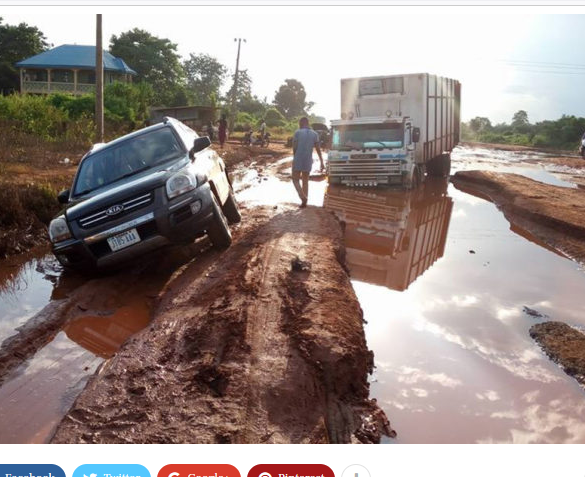What Gov Udom Should Do About Calabar- Itu Highway Horror
Traveling through Calabar -Itu highway this day is like fearfully passing through the valley of the shadow of death. You can only know when you commence the journey with no certainty on when you will reach your destination. The road which can aptly be described as a death trap has completely collapsed as commuters go through pains on a daily basis in the process of navigating it. But the government of Akwa Ibom State can take steps to impact more positively on the lives of the suffering road users by alleviating their stress of traveling through this road. The Udom Emmanuel’s led government can achieve this by creating an alternative route for travellers through the Oron jetty to Calabar. He can even adopt the Lagos State inland water way transport model that helped to ease the traffic gridlock in some Lagos routes. If this option is explored and the Oron – Calabar jetties revived, the pains and frustration associated by travelling through the dreary Calabar Itu highway will be drastically scaled down.
A friend of mine who happens to be a top public servant while on a duty tour with his colleagues from Abuja to Calabar enroute to Uyo recently narrated their ordeal along the Calabar-Itu high to me. During the said trip, my friend recounted how they had first-hand experience of the total collapse of the said road, with broken down vehicles littered everywhere and stranded commuters helplessly seeking for assistance. He said that the road situation was so terrible such that even the four-wheel drive all-terrain vehicles used in conveying them as a team from Calabar found it extremely difficult to navigate and meander through the marshy road. He recounted how they had to go through four gruesome hours between Calabar to Uyo in a trip that previously use to take between 45 minutes to one hour to drive through.
We could recall that the master plan for the construction of this highway was designed in the 1970s during the administration of General Gowon as Nigerian Head of State then and Brigadier General U J Esuene as South Eastern State Governor during the said era. The highway was eventually constructed and completed during General Obasanjo’s era as head of State. Unfortunately, this road has consistently suffered neglect by consequent administrations in the country despite being a major transport route for movement of people and goods from the Akwa Ibom- Cross Rivers axis to the northern part of the country.
Before the construction of this road in the 1970s, the only available mean of travelling from the mainland part of the then South Eastern State (now Akwa Ibom) was usually through ferry, flying boat or canoe through the inland water way from the Oron Jetty to Calabar . Today, those jetties have all been abandoned while the inland water transport system is almost dead.
With the current deplorable state of the Calabar- Itu highway, coupled with the neglect of the Oron- Calabar jetties, the people of Akwa Ibom and Cross River State are currently in cul de-sac. They are now stuck between the devil and the deep blue sea with no available alternative route for movements between the two states.
The pathetic condition of this highway and the anguish it inflicts on the people is better experienced than analysed on paper. But while the waiting and hoping game for the federal government to intervene and reconstruct the highway continues, the situation demands an urgent alternative way forward. As the only road linking Akwa Ibom with Cross Rivers State, passengers who commute this highway go through nightmares, while daily travellers pass through traumatic experiences. The attendant effect of this situation on livelihoods leaves the people in heavy groaning. The economy of the area and small businesses that were thriving there have all gone under. Vehicles, especially commercial drivers spend hours or a day on their trips, while trucks and trailers spend days or weeks on the road. Often times, passengers disembark in the gridlock to continue their journey on motorcycles, which are also barely able to meander through the long stretch of trailers on the muddy swamp-like road. In the course of this, countless mishaps occur, with passengers sustaining varying degrees of injury and loss of personal items.
The economic situation of communities along the highway has also been badly affected by the state of the road. Okut Ikang town which used to be a booming agro business hub is now like a ghost town because the economy of the place has died completely due to the terrible condition of the road. At Itu bridge head, the fishing business has also been severely affected because travellers who use to come from different parts of Nigeria to purchase all species of fish can no longer travel there. Also, Odukpani junction in Cross Rivers State which used to be the centre of thriving businesses when the state of the road was in good shape, is now a shadow of its former self.
The unfortunate dimension to this abandoned highway is that it is located in a State the produces the highest oil revenue earning in the country. More sadly is the fact that it is the oil revenue that is used in the construction of railway lines and super highways in various parts of the country that bring little or nothing to the national financial coffer. Under normal circumstances, one would have expected Akwa Ibom to receive a fair treatment in terms of infrastructure distribution and maintenance because of the size of revenue it brings to the national table, but unfortunately the reverse is the case here. The Calabar -Itu highway situation in fact can be described as the real time case of neglect of the goose that lays the golden eggs.
WAY FORWARD:
The best and fast alternative to the Calabar -Itu highway horror at moment is the revival of the Oron – Calabar water way jetties. This can be achieved through a well-coordinated corroborative arrangement between Akwa Ibom and cross Rivers State in accordance with the National Inland Waterways Authority (NIWA) standard. NIWA is established by law as a federal government agency with the primary responsibility to improve and develop Nigeria’s inland waterways for navigation. It has the objective to improve and develop inland waterways for navigation; provide an alternative mode of transportation for the evacuation of economic goods and persons; and execute the objectives of the national transport policy as they concern inland waterways. NIWA’s core mission is to provide regulatory, economical and operational leadership in the Nation’s Inland Waterways system and develop infrastructural facilities for an efficient intermodal transportation system in line with global best practices that is safe, seamless and affordable.
If the Akwa Ibom State government and its Cross Rivers State counterpart can explore this alternative of diverting travelers to use the Oron-Calabar water way, the stress of going through the Calabar -Itu highway will be drastically reduced. I don’t thinks reviving the jetties and making it to meet international safety standard for travelers requires rocket science to achieve. The initiative will even provide employment and another level of value chain to the economy of both states if adopted.





